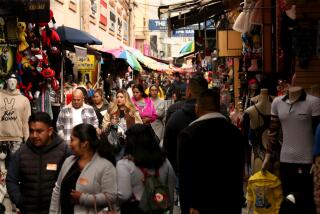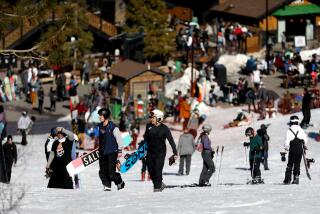Las Vegas is waking up. This California town on the road there is struggling to come back to life
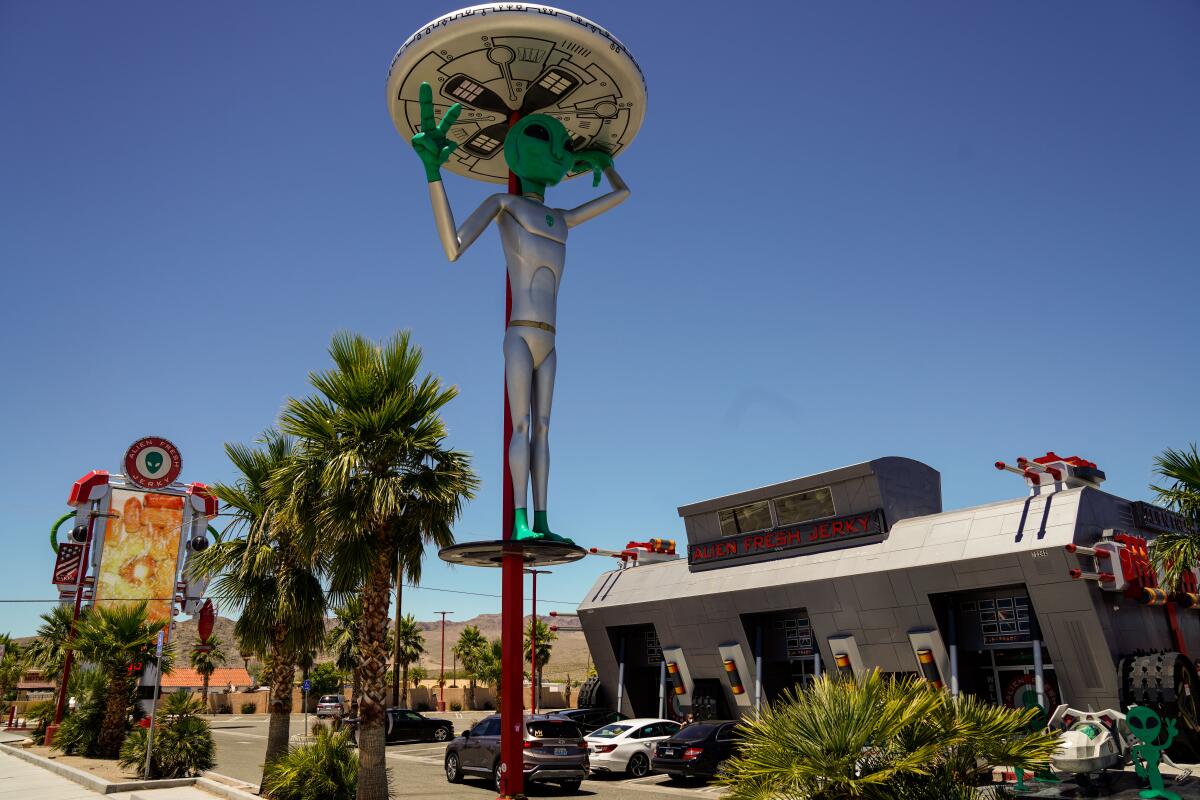
- Share via
Baker, Calif. — Lazarus Dabour used to arrive at the Mad Greek Cafe before the sun rose above the desert sky. He’d scan the 24-hour restaurant’s parking lot, clean the bathrooms, monitor the cash register, and prep fan-favorite breakfast items such as strawberry shakes or La Bomba breakfast burritos.
On a busy day, the restaurant’s 29-year-old general manager could serve as many as 1,200 customers before straggling off after a 16-hour shift.
But this was not a normal day. It was June 4 and Las Vegas casinos had just reopened after the coronavirus shut down the famed Strip, along with much of the country. His family’s restaurant had not seen a customer in more than two months. This Mojave Desert town on the way to Las Vegas became so dead that the Dabours simply closed down to renovate.
“We go as Vegas goes. A lot of businesses had to close,” Dabour said. “Not because we were ordered to, but because, financially, it was cheaper to operate a closed business than an open business.”
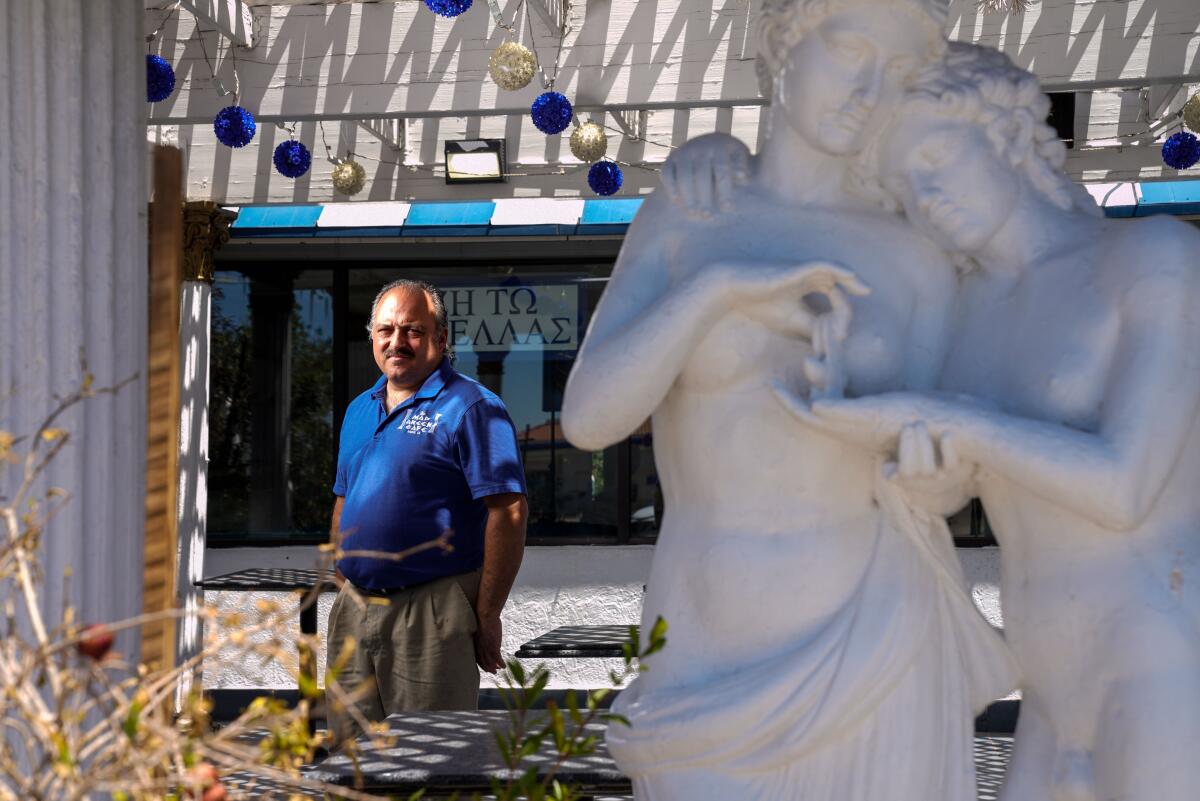
Few places are as dependent on Sin City as tiny Baker, home to the self-proclaimed “World’s Tallest Thermometer.” The town is a dot on the road between Los Angeles and Vegas, and its lifeblood is the weary or curious traveler coursing along Interstate 15.
But when Las Vegas reopened, any illusion that tourists would rush back evaporated. Like much of the U.S., the return to normal — whatever that is in the age of COVID-19 — would be slow and tentative. On Day 1, Baker was a virtual ghost town. Its parking lots were all but empty, and finding customers was like looking for the last couple of eggs after an Easter hunt.
Only a few corporate fast-food chains were still open, such as the Subway in the Valero gas station.
“It’s a small town in the middle of the desert, a place leading to a destination. And we’ve been abandoned,” said Luis Ramallo, owner of Alien Fresh Jerky.
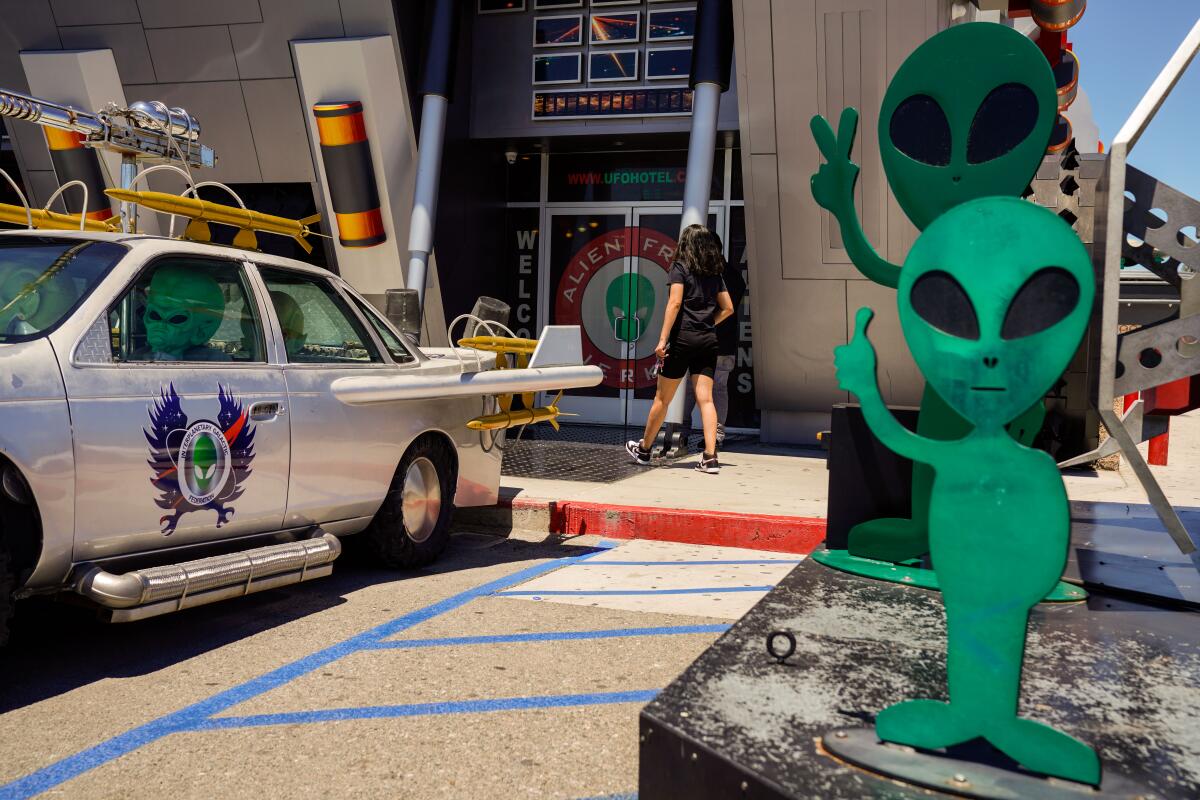
A week after Las Vegas reopened, a handful of customers shopped for drinks and packaged snacks at the Country Store, across the street from the Mad GreekCafe. The 38-year-old store owner, Jin Yang, was delighted to see people coming back.
His store stayed open during the COVID-19 shutdown, though not a soul would come in for hours at a time. Almost a week after Vegas started to reopen, business was slowly returning.
John Fowler, 72, a Bakersfield resident, entered the store as part of his annual “Father’s Day-ish” Las Vegas trip with friends.
Baker was less crowded than usual, he said. Still, he was more concerned with losing too much money in Las Vegas’ casinos than contracting the virus that had put the world on hold.
“I’ve been taking this trip for 25 to 30 years, and there’s usually four or five of us, but it trimmed down to two this year,” Fowler said. “After a long stretch, it’s nice to stop by here for a break.”
He added a thought for the near future: “Hopefully we’ve gone and flattened the curve.”
Down Baker Boulevard, where six of the 27 buildings lie vacant, failed motels stood bleached by the sun. It was 111 degrees. Locals joked that qualified it as a “cool day.”
Even as the lights dimmed along the Las Vegas Strip, the “Gateway to Death Valley’s” blinking landmark stayed lit.
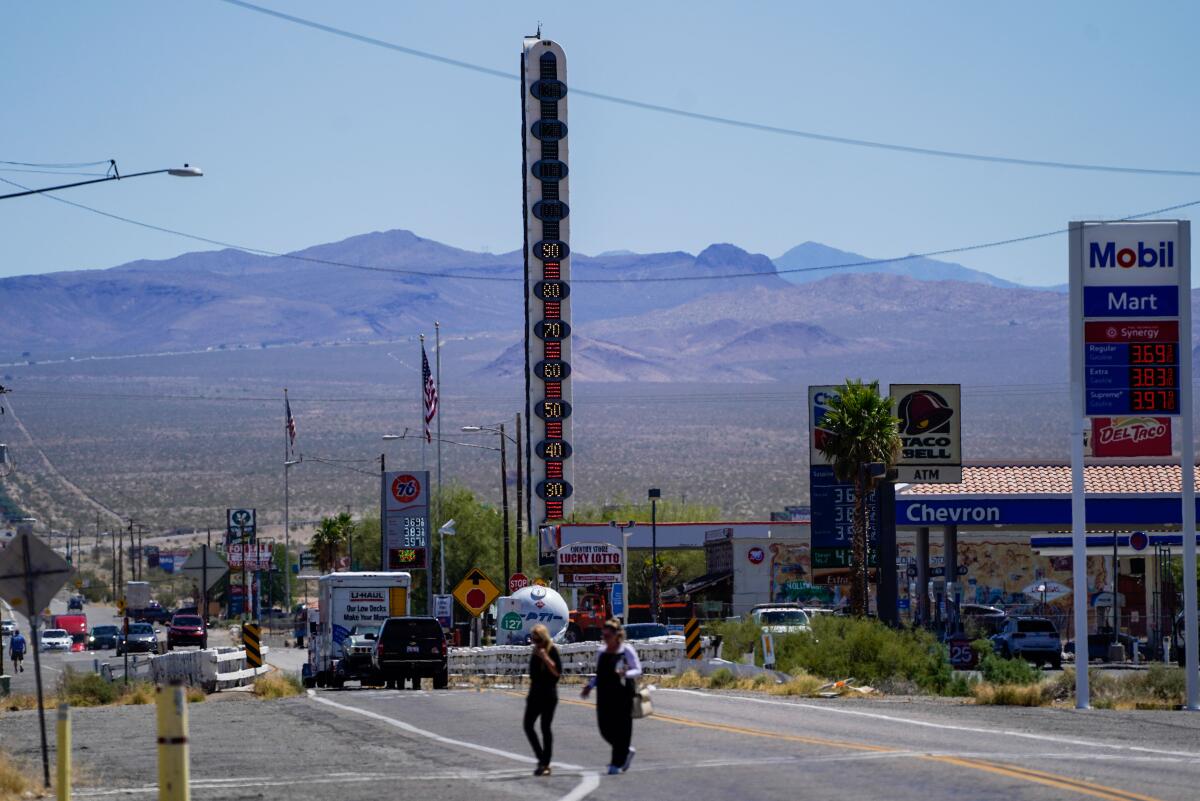
LaRae Harguess, owner of the 134-foot-tall electric thermometer, was financially devastated by the closure. Her family sold the thermometer 20 years ago. She purchased it back in 2014 after years of neglect by two previous owners.
Before then, the thermometer was just a large steel protrusion rising from the ground. It bristled with residual copper wires — the few bits that scalpers had failed to swipe.
Knowing the thermometer’s storied past, Harguess refused to turn it off as the country sank into the pandemic. The monthly $1,000 electric bill especially stung because there was no gift shop revenue to offset it.
Despite the financial hardship imposed on every business owner by the virus, only one place permanently closed, said Jacob Overson, Baker Community Service District general manager. Smoky Jerky, competitor to Alien Fresh Jerky, was struggling even before the stay-at-home orders in March. This month, it shut its doors.
Ramallo, 62, was optimistic enough to continue planning a UFO-themed hotel in Baker. But he is unsure if the hotel will open in time to celebrate his business’ 20th anniversary. He had to put construction on hold because of the coronavirus.
Ramallo reopened for Memorial Day weekend but saw virtually no business, and even now, he said, business is operating at a relative crawl.
“We had to take our savings to survive,” Ramallo said. “I’m hopeful that people will come back by the summer, but we don’t know when this will end. The people with money can wait, but people like us can’t.”
Ravinder Grewal, 65, who owns 21 franchise restaurants in Baker, including Cinnabon, Yogurtland, Taco Bell and Pizza Hut, made it his top priority to reopen his stores. Grewal employed 150 Baker residents before the shutdown, but cut hours for half and laid off a quarter of his workers as business dropped by 90%.
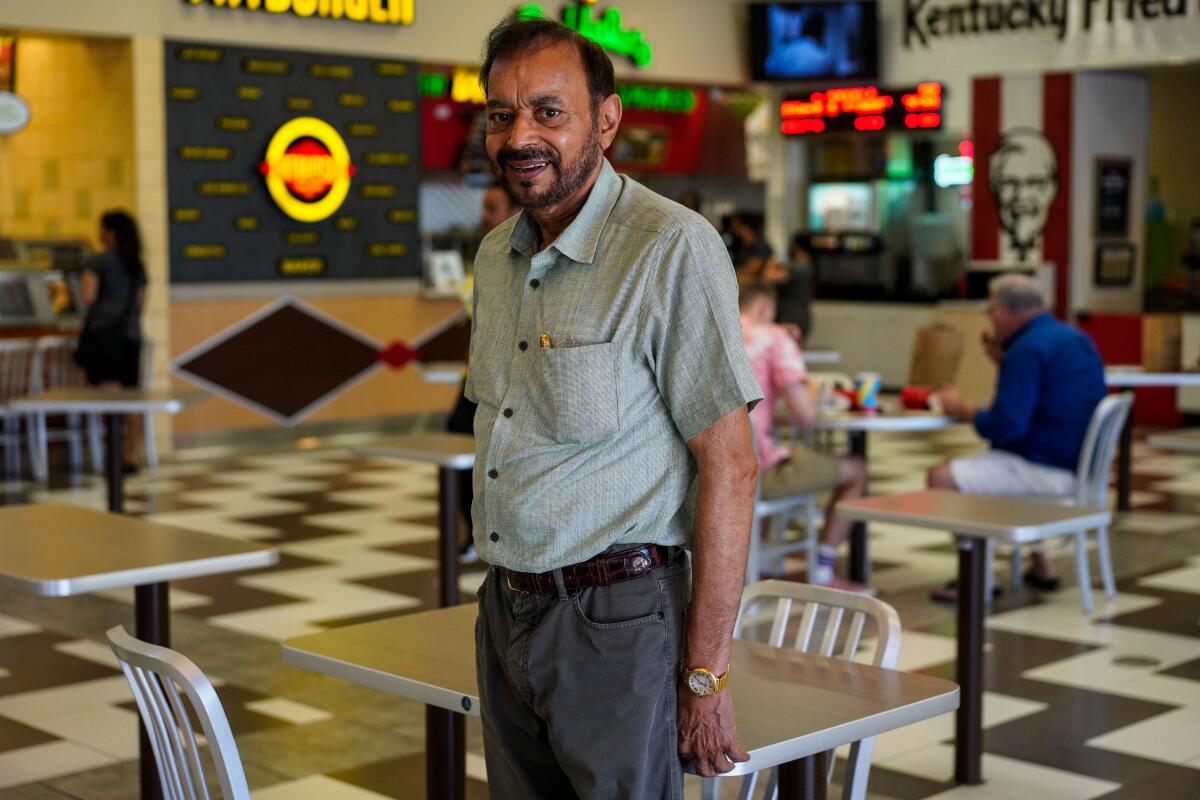
“Baker will survive, we just need to be able to wait it out,” Grewal said.
But for residents, the shutdown raised worries that their desert oasis was on the brink of permanent injury; locals cannot survive in the city without job prospects.
Yesenia Navarro, a 33-year-old employee at the World’s Largest Thermometer gift shop, hates what COVID-19 has done to her once close-knit community. More cars were leaving than coming in, she said. Navarro’s neighborhood in Paradise Mobile Home Park used to be filled with laughter and camaraderie. Neighbors barbecued and children rode their bikes.
Now, many people are out of work and the quarantine orders kept families inside their homes, leaving a dent in the sense of community, Navarro said.
As people kept to themselves, Navarro was uncertain if the usual Fourth of July festivities would go on. She wondered what Baker would look like a year from now.
Overson, Baker’s general manager, feared the pandemic would only worsen his town’s perennial problem: a dwindling population, which causes businesses to shut down, leading to fewer employment opportunities.
“We lost a lot of residents back in ‘08 and the place was a lot busier back then,” Overson said. “But we never really fully recovered from the 2008 recession.”
On June 4 at the Mad Greek Cafe, family patriarch Larry Dabour, 51, sat, pensive, in one of the restaurant’s dozen empty turquoise booths. Idyllic paintings of Greece were propped against them, and hardware supplies were scattered across the empty storefront.
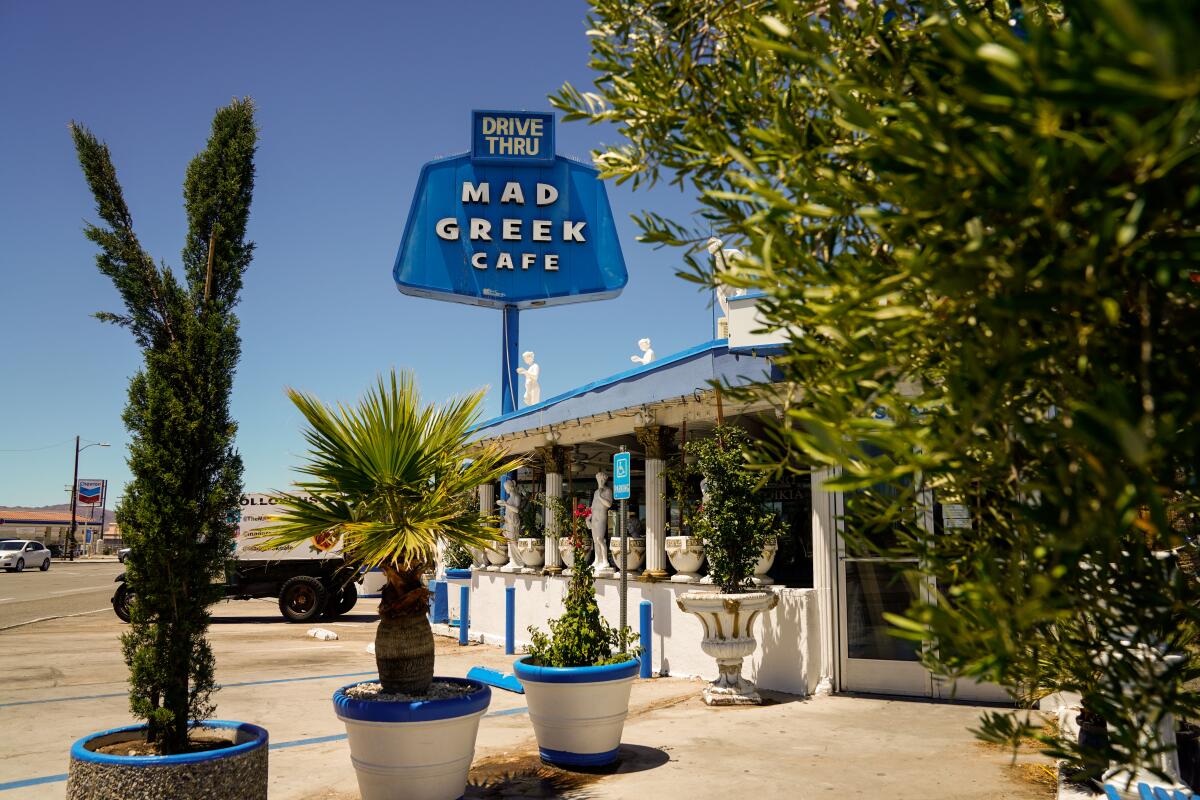
Lazarus Dabour originally intended to reopen in April, but he postponed twice, as Las Vegas remained closed. He knew he wouldn’t be able to recoup the cost of opening during the COVID-19 shutdown. His current goal is July 1.
Four days after Las Vegas announced its closure, Darbour saw his sales drop to half of what he needed to stay open. He gave away supplies and perishables to employees, locked the doors and laid off 26 of his 30 workers.
Unlike restaurants in metropolitan areas, Dabour said Baker’s businesses cannot rely on the town’s 500 residents. And delivery service? Not a chance.
“Who would we deliver to? The cactus or the rocks?” Dabour asked. “It’s going to be a long haul to get back to where we were. There’s no guarantee when I open the doors that we’ll have a customer.”
More to Read
Sign up for Essential California
The most important California stories and recommendations in your inbox every morning.
You may occasionally receive promotional content from the Los Angeles Times.
